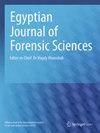大学护理专业学生对法医护理的认识和态度及其影响因素:一项混合方法研究
IF 1.3
Q3 MEDICINE, LEGAL
引用次数: 0
摘要
法医护理融合了医疗保健和法律专业知识以解决创伤和暴力问题,其重要性不言而喻,但在护理教育中却往往代表性不足。许多护理专业的学生缺乏对这一领域的了解,因此需要加强教育以改善患者护理和法律效果。本研究旨在评估大学护理专业学生对法医护理的知识和态度,并确定影响其知识的因素。研究采用混合方法设计,在沙特一所护理学院进行,方便抽样调查了 250 名学生。数据收集采用了结构化问卷,包括两个部分。定量部分包括人口和学术特征、对法医护理的了解和看法、法医证据知识以及对法医护理的态度。定性部分包括四个开放式问题,涉及影响法医知识的因素。数据分析包括推理统计和内容分析。研究显示,80.4%的护理专业学生缺乏法医护理知识,只有 59.76%的学生对法医证据有一定的了解。研究发现,对法医护理的态度与法医证据知识之间存在很强的正相关关系(r = 0.817,p < 0.001),表明积极的态度可以预测法医证据知识中 66.8% 的差异。主要障碍包括缺乏上层管理人员的支持、资源不足以及对教师资格的担忧。学生们建议将法医护理纳入课程、开设专业课程、促进研究和社交媒体宣传活动。这些发现凸显了参与者在法医护理知识方面的巨大差距和误解,强调了在这一领域开展教育和提高认识的迫切需要。研究强调了将法医护理概念纳入本科课程、加强师资培训和利用多样化教学模式的潜在意义。缩小这些差距不仅能提高未来护士在法医护理方面的能力,还有助于更好地护理病人。本文章由计算机程序翻译,如有差异,请以英文原文为准。
Knowledge and attitude of university nursing students towards forensic nursing and their influencing factors: a mixed-methods study
Forensic nursing, which merges healthcare and legal expertise to address trauma and violence, is vital yet often underrepresented in nursing education. Many nursing students lack knowledge in this field, underscoring the need for enhanced education to improve patient care and legal outcomes. This study aimed to assess university nursing students’ knowledge and attitudes towards forensic nursing, as well as identify factors influencing their knowledge. A mixed-methods design was conducted at a Saudi nursing college with a convenience sample of 250 students. The data were collected using a structured questionnaire comprising two parts. The quantitative part included demographic and academic characteristics, knowledge and opinions on forensic nursing, knowledge of forensic evidence, and attitudes towards forensic nursing. The qualitative part consisted of four open-ended questions about factors affecting forensic knowledge. Data analysis involved inferential statistics and content analysis. The study revealed that 80.4% of nursing students lacked prior knowledge of forensic nursing, and only 59.76% had some awareness of forensic evidence. A strong positive relationship was found between attitudes towards forensic nursing and knowledge of forensic evidence (r = 0.817, p < 0.001), indicating that positive attitudes could predict 66.8% of the variance in forensic evidence knowledge. Key barriers included lack of support from upper management, insufficient resources, and concerns about faculty qualifications. Students recommended integrating forensic nursing into the curriculum, offering specialized programs, and promoting research and social media awareness campaigns. These findings underscore significant gaps in knowledge and misconceptions about forensic nursing among participants, emphasizing the critical need for education and awareness in this field. The study highlights the potential implications for integrating forensic nursing concepts into undergraduate curricula, enhancing faculty training, and utilizing diverse teaching modalities. Addressing these gaps will not only improve future nurses’ competency in forensic nursing, but also contribute to better patient care.
求助全文
通过发布文献求助,成功后即可免费获取论文全文。
去求助
来源期刊

Egyptian journal of forensic sciences
MEDICINE, LEGAL-
CiteScore
2.00
自引率
0.00%
发文量
51
审稿时长
17 weeks
期刊介绍:
Egyptian Journal of Forensic Sciences, the official publication of The International Association of Law and Forensic Sciences (IALFS), is an open access journal that publishes articles in the forensic sciences, pathology and clinical forensic medicine and its related specialities. The journal carries classic reviews, case studies, original research, hypotheses and learning points, offering critical analysis and scientific appraisal.
 求助内容:
求助内容: 应助结果提醒方式:
应助结果提醒方式:


